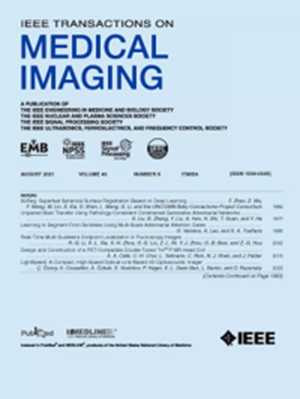Improving Learning of New Diseases through Knowledge-Enhanced Initialization for Federated Adapter Tuning.
IF 9.8
1区 医学
Q1 COMPUTER SCIENCE, INTERDISCIPLINARY APPLICATIONS
引用次数: 0
Abstract
In healthcare, federated learning (FL) is a widely adopted framework that enables privacy-preserving collaboration among medical institutions. With large foundation models (FMs) demonstrating impressive capabilities, using FMs in FL through cost-efficient adapter tuning has become a popular approach. Given the rapidly evolving healthcare environment, it is crucial for individual clients to quickly adapt to new tasks or diseases by tuning adapters while drawing upon past experiences. In this work, we introduce Federated Knowledge-Enhanced Initialization (FedKEI), a novel framework that leverages cross-client and cross-task transfer from past knowledge to generate informed initializations for learning new tasks with adapters. FedKEI begins with a global clustering process at the server to generalize knowledge across tasks, followed by the optimization of aggregation weights across clusters (inter-cluster weights) and within each cluster (intra-cluster weights) to personalize knowledge transfer for each new task. To facilitate more effective learning of the inter- and intra-cluster weights, we adopt a bi-level optimization scheme that collaboratively learns the global intra-cluster weights across clients and optimizes the local inter-cluster weights toward each client's task objective. Extensive experiments on three benchmark datasets of different modalities, including dermatology, chest X-rays, and retinal OCT, demonstrate FedKEI's advantage in adapting to new diseases compared to state-of-the-art methods.通过知识增强初始化联邦适配器调优提高对新疾病的学习。
在医疗保健领域,联邦学习(FL)是一种广泛采用的框架,可实现医疗机构之间的隐私保护协作。随着大型基础模型(FMs)展示出令人印象深刻的功能,通过经济高效的适配器调优在FL中使用FMs已成为一种流行的方法。考虑到快速发展的医疗保健环境,对于个人客户来说,通过调优适配器,同时借鉴过去的经验,快速适应新的任务或疾病是至关重要的。在这项工作中,我们介绍了联邦知识增强初始化(federalknowledgeenhanced Initialization, FedKEI),这是一个新颖的框架,它利用过去知识的跨客户端和跨任务转移来生成知情初始化,以便使用适配器学习新任务。FedKEI首先在服务器上进行全局聚类过程,以泛化跨任务的知识,然后优化跨集群(集群间权重)和每个集群(集群内权重)的聚合权重,以个性化每个新任务的知识转移。为了更有效地学习簇间和簇内权重,我们采用了一种双级优化方案,该方案协同学习客户端的全局簇内权重,并针对每个客户端的任务目标优化局部簇间权重。在三个不同模式的基准数据集上进行的广泛实验,包括皮肤病学、胸部x射线和视网膜OCT,证明了与最先进的方法相比,FedKEI在适应新疾病方面的优势。
本文章由计算机程序翻译,如有差异,请以英文原文为准。
求助全文
约1分钟内获得全文
求助全文
来源期刊

IEEE Transactions on Medical Imaging
医学-成像科学与照相技术
CiteScore
21.80
自引率
5.70%
发文量
637
审稿时长
5.6 months
期刊介绍:
The IEEE Transactions on Medical Imaging (T-MI) is a journal that welcomes the submission of manuscripts focusing on various aspects of medical imaging. The journal encourages the exploration of body structure, morphology, and function through different imaging techniques, including ultrasound, X-rays, magnetic resonance, radionuclides, microwaves, and optical methods. It also promotes contributions related to cell and molecular imaging, as well as all forms of microscopy.
T-MI publishes original research papers that cover a wide range of topics, including but not limited to novel acquisition techniques, medical image processing and analysis, visualization and performance, pattern recognition, machine learning, and other related methods. The journal particularly encourages highly technical studies that offer new perspectives. By emphasizing the unification of medicine, biology, and imaging, T-MI seeks to bridge the gap between instrumentation, hardware, software, mathematics, physics, biology, and medicine by introducing new analysis methods.
While the journal welcomes strong application papers that describe novel methods, it directs papers that focus solely on important applications using medically adopted or well-established methods without significant innovation in methodology to other journals. T-MI is indexed in Pubmed® and Medline®, which are products of the United States National Library of Medicine.
 求助内容:
求助内容: 应助结果提醒方式:
应助结果提醒方式:


